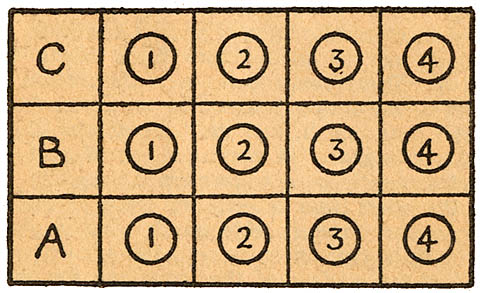
Level 7
Mordecai Roshwald, 1959
Premise
The superpowers have built deep shelters in case of nuclear war. The
top level is for everyone. Level 2 is for peaceniks and other anti-government
activists: "The idea behind this," we are told, "is to appease all the
doubtful and subversive elements by giving them a more secure and privileged
shelter level." Levels 3, 4, and 5 are for elite civilians. Level 6 is for
defensive military personnel. And Level 7, 4400 feet below the surface, is
an entirely self-sufficient shelter for the four men who will push the button
and the 496 support personnel who allow them to perform their function:
doctors, atomic engineers to monitor the underground reactor that supplies
their power, psychologists to give them electroshock treatments when they
go insane, and so forth. There are 250 men and 250 women, because should
war occur, Level 7 is the last hope for humanity to continue; the upper
levels might fail. And really, it makes no difference whether war occurs
or not, because they're permanently sealed in anyway. They didn't know
that would be the case when they entered the shelter, but most of them
take the news pretty well. After all, they've been carefully chosen for
Level 7. "One of the essential conditions of selection for work down
here," says the narrator, "irrespective of what form the work would take,
was that the candidate should have no strong personal attachment to anybody
remaining on earth."
The narrator is Officer X-127; all inhabitants of Level 7 have similar
designations rather than names, in order that they identify with their
roles in their tiny underground world rather than with anything from
their lives above. Level 7 is a short epistolary novel presenting
his diary.
Evaluation
When I was reading up on nuclear war fiction, most of the articles I
encountered described most of it as hackwork, and my
own reading backs that
up. The most frequently cited exception was Level 7. Naturally, this
also turned out to be the one that wasn't available at any public library in
the Bay Area. It looked like San Francisco Central had it, but no, it turns
out that the SFPL catalog lists every book the SFPL is aware of, whether or
not it has a copy of said book in the system. I had almost given up when I
realized — wait, I can actually, y'know, buy a copy. It turned out
that a used copy plus shipping cost less than the BART fare to San Francisco.
And I am pleased to report that the articles were right; this is a good book.
Commentary
Level 7 naturally calls to mind Dr.
Strangelove, another Cold War satire. In fact, Level 7 sort
of picks up where Dr. Strangelove leaves off — hey, yeah, what
about those mine shafts? But I wouldn't want to make too much of
this. Dr. Strangelove, while bearing a serious message, is also
pretty goofy. Its modus operandi is to make everyone involved in the Cold
War look ridiculous. Level 7 is different: not the hot-blooded satire
that Terry Southern wrote for Stanley Kubrick, but cold and dry as the South
Pole. In a lot of ways it's more reminiscent of The
Curious Incident of the Dog in the Night-Time. The central gimmick
of that book is an autistic narrator who is incapable of understanding the
emotions of those around him. X-127 and his fellows may not be autistic,
but they are so emotionally stunted — X-127 calmly avers that he is
ideally suited for Level 7 because he is "most likely incapable of love"
— that the effect is much the same. Some examples:
- One character, X-117, flips out because he doesn't want to push the
buttons that will kill three billion people. His fellow Push-Button Officer,
X-107, cautions him against getting "sentimental about the crust of the
earth, which it may be our duty to lay waste." Psychologist P-867 suggests
that he marry one of the 250 female survivors down in the bunker as "a
harmless outlet for his sociable impulses."
- After the war, X-127 is asked how he can live with himself after killing
every living thing on the surface of the earth. X-127 replies that "I feel
better now than I did before. Not that I enjoyed pushing those buttons
particularly, but doing so made me feel rather important."
- Having been asked, "Was pushing the buttons a very difficult thing to
do?", X-127 writes that "I laughed and told her that it was the simplest
job imaginable. A child could have done it. An imbecile. A trained
monkey!" After all, here is what his console looks like:

The joke, of course, is that only an imbecile, the sort of person
who can hear a question like "Was pushing the buttons a very difficult
thing to do?" and not even consider the possibility that the speaker
might have meant "ethically difficult" or "emotionally difficult" rather
than "physically difficult," could do X-127's job. The very phrase
"Push-Button Officer" is darkly funny, as is the action sequence in which
we see said officers performing their lone task. "The loudspeaker spoke
again. 'Push Button A1!' I pressed the button." I mentioned Dr.
Strangelove earlier, but the nuclear war in Level 7 more closely
resembles the murder of the hibernating astronauts in 2001. Click!
"Planetary life functions terminated."
"I still do not believe I could be a hangman," X-127 says. "But to push
a button, to operate a 'typewriter' — that is a very different thing.
It is smooth, clean, mechanical. That is where X-117 went wrong.
For him it was the same thing. He could even talk about strangling P and
me with his bare hands! Maybe this inability to distinguish between
killing with the bare hands and pushing a button was the source of his
mental trouble."
Of course, the Cold War is over now, but the underlying moral diseases
highlighted by Level 7 are still with us. We shake our heads at
X-127, who doesn't understand that the true "mental trouble" is drawing
a false distinction between mass murder and pushing a button to launch
a nuclear war... and yet we elect leaders who flip out over the prospect
of a brain-dead woman being taken off life support at the same time that
they push the buttons on their congressional voting devices to authorize
and fund a war that's killing tens of thousands, or push the buttons on
their telephones to deliver the orders to send in the troops and drop
the bombs that are taking so many lives and causing so much suffering.
In fact, things have arguably gotten worse on this score since Level
7 was written. In the aftermath of World War II, a war in which only
15% of American soldiers could bring themselves to fire their weapons, the
idea of carefully selecting amoral order-followers who kill without regret
was a nightmarish sci-fi concept. But by the time of the Vietnam War the
military had developed training techniques that got that figure up to 95%
— and that was with a draft! Now the military is a self-selected
group of people who have decided ahead of time that they can live with
what they'll be ordered to do out on a battlefield, people who can calmly
tell reporters
"I enjoy killing Iraqis." People who by the time they enter the
military have logged thousands of hours huddled around their TV sets
practicing murdering people... by pushing buttons.


Return to the Calendar page!
|



